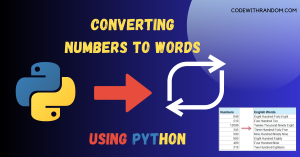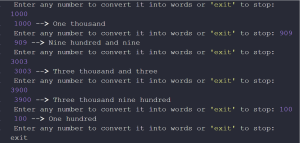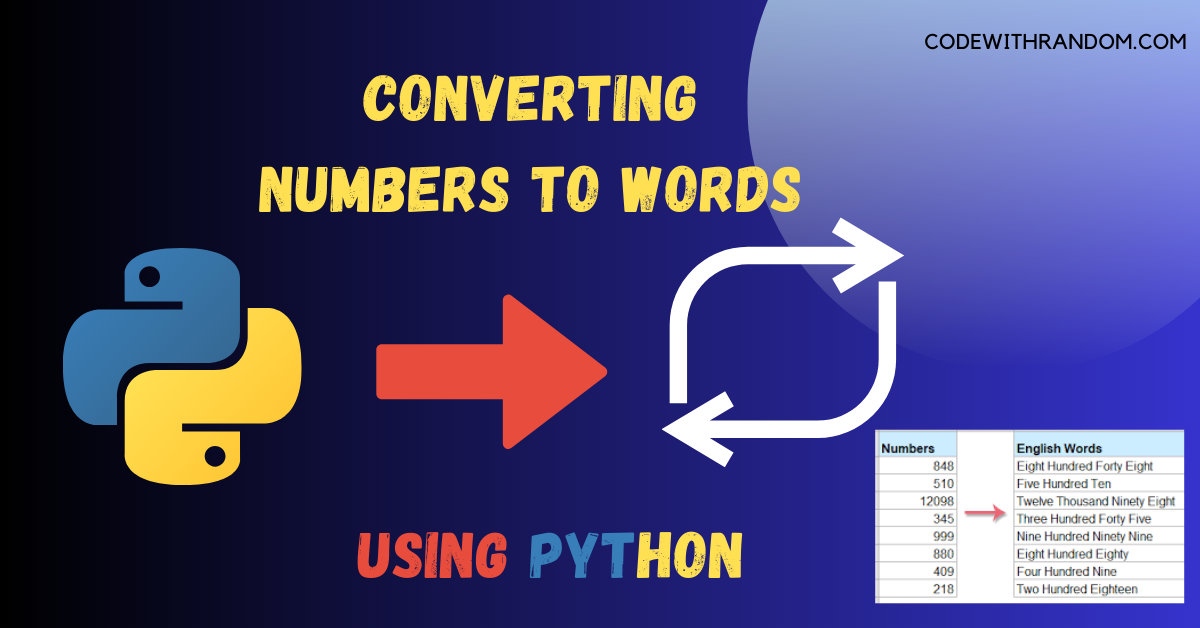Converting numbers to words in Python
Hello coder, welcome to the codewithrandom blog. In this article, we create Converting numbers to words program using Python Programming with Complete Source Code. Converting numbers to words is a common problem encountered in many programming tasks. While it may seem like a daunting task, with Python it’s actually quite simple. In this blog, we’ll walk you through a Python program that can convert numbers to words. This python program converts given integer number to its equivalent words without using any external library.

To Run the Converting numbers to words program in Python , you can follow these steps:
step 1: open any python code Editor.
step 2: Make a python file main.py
step 3: Copy the code for the Converting numbers to words program in Python, which I provided Below in this article, and save it in a file named “main.py” (or any other name you prefer).
step 4: Run the file main.py and your program will run
Complete code here👇👇
one_digit_words = {
'0': ["zero"],
'1': ["one"],
'2': ["two", "twen"],
'3': ["three", "thir"],
'4': ["four", "for"],
'5': ["five", "fif"],
'6': ["six"],
'7': ["seven"],
'8': ["eight"],
'9': ["nine"],
}
two_digit_words = ["ten", "eleven", "twelve"]
hundred = "hundred"
large_sum_words = ["thousand", "million", "billion", "trillion", "quadrillion", "quintillion", "sextillion", "septillion", "octillion", "nonillion"]
def converter(n):
word = []
if n.startswith('-'):
word.append("(negative)")
n = n[1:]
if len(n) % 3 != 0 and len(n) > 3:
n = n.zfill(3 * (((len(n)-1) // 3) + 1))
sum_list = [n[i:i + 3] for i in range(0, len(n), 3)]
skip = False
for i, num in enumerate(sum_list):
if num != '000': skip = False
for _ in range(len(num)):
num = num.lstrip('0')
if len(num) == 1:
if (len(sum_list) > 1 or (len(sum_list) == 1 and len(sum_list[0]) == 3)) and i == len(sum_list) - 1 and (word[-1] in large_sum_words or hundred in word[-1]):
word.append("and")
word.append(one_digit_words[num][0])
num = num[1:]
break
if len(num) == 2:
if num[0] != '0':
if (len(sum_list) > 1 or (len(sum_list) == 1 and len(sum_list[0]) == 3)) and i == len(sum_list) - 1:
word.append("and")
if num.startswith('1'):
if int(num[1]) in range(3):
word.append(two_digit_words[int(num[1])])
else:
number = one_digit_words[num[1]][1 if int(num[1]) in range(3, 6, 2) else 0]
word.append(number + ("teen" if not number[-1] == 't' else "een"))
else:
word.append(one_digit_words[num[0]][1 if int(num[0]) in range(2, 6) else 0] + ("ty " if num[0] != '8' else 'y ') + (one_digit_words[num[1]][0] if num[1] != '0' else ""))
break
else:
num = num[1:]
continue
if len(num) == 3:
if num[0] != '0':
word.append(one_digit_words[num[0]][0] + " " + hundred)
if num[1:] == '00': break
num = num[1:]
if len(sum_list[i:]) > 1 and not skip:
word.append(large_sum_words[len(sum_list[i:]) - 2])
skip = True
word = " ".join(map(str.strip, word))
return word[0].lstrip().upper() + word[1:].rstrip().lower() if "negative" not in word else word[:11].lstrip() + word[11].upper() + word[12:].rstrip().lower()
if __name__ == "__main__":
while True:
try:
n = input("Enter any number to convert it into words or 'exit' to stop: ")
if n == "exit":
break
int(n)
print(n, "-->", converter(n))
except ValueError:
print("Error: Invalid Number!")Output👇👇

Conclusion
Hurray! You have successfully Create the Converting numbers to words project using the Python Programming . We learned to create amazing python project .Converting numbers to words may seem like a daunting task, but with the Python, it’s actually quite easy. By following the steps outlined in this blog post, you can easily convert any number to its corresponding word. Hope you enjoyed building with us! Visit our homepage and you get lot’s of projects💝
Create Your Own Snake Game using Python(Click Here to read this article )
Make Your Own Brick Breaker Game Using Python ( Click Here to read this article)
Build a Hangman Game Using Python programming ( Click Here to read this article )



